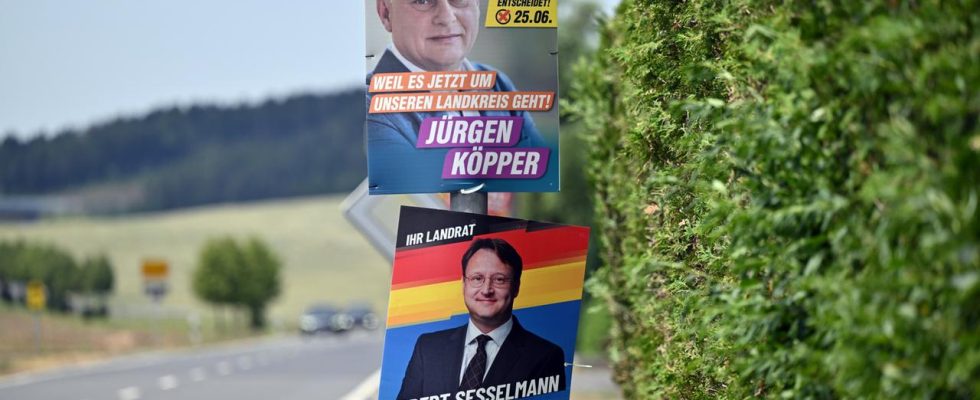For many parties, an AfD district administrator is a nightmare. In some places, people are therefore looking to common candidates, but experts warn of an attrition effect.
Sina Martin is worried and that’s because of the district election in her home town of Sonneberg. Together with her father, she runs a shop for teddy bears here in Thuringia – already in the fifth generation. Actually, she would much rather talk about the city’s great toy tradition than about politics.
“The atmosphere is very excited at the moment,” she says. “I hope that this will flatten out again and that this is not a division in society, but that we remember that we have to stick together.”
Runoff election in Sonneberg
The run-off election is coming up in your district today: CDU candidate Jürgen Köpper and AfD candidate Robert Stuhlmann are fighting for the top municipal office of the district administrator. In the first ballot, Stuhlmann got 46.7 percent, Köpper 35.7 percent. The SPD, Left, Greens and FDP have now called for support for Köpper in the runoff. They want to prevent armchair man.
It would be the first time that an AfD politician has held such an office. And that in Thuringia, of all places, where the Office for the Protection of the Constitution has long classified the AfD and its state boss Björn Höcke as right-wing extremists. That’s why the mood is “very excited”, as Sina Martin reports. The election received nationwide media attention.
“They were too comfortable until now”
Your neighbor Margret Sturm is less diplomatic. She took over the eyewear business from her parents 23 years ago and worries about the image of the entire region. “We have to prevent blue. Blue always has Nazis in tow and we’re not ready for that,” she says, meaning blue for the AfD. In any case, not the whole population thinks so “brown-heavy”, there are still “normal people”, as Sturm puts it: “But you really have to say, they were too comfortable up to now.”
Broad alliance in Brandenburg
too comfortable? Politicians from different parties in the Brandenburg district of Dahme-Spree do not want to be accused of this. Here, too, a new district administrator will be elected in October, and the AfD is strong here too. Many factions have now agreed on a common candidate in advance, and they have that Report from Berlin previously confirmed – from political camps that could hardly be more different: CDU, FDP, Left Party, Free Voters and the district parliamentary group from Independent Citizens Lists (UBL) want to support the non-party Sven Herzberger. They want to present the alliance to the public next week. The Greens would also consider joining after the summer holidays, says Herzberger.
He has been mayor in Zeuthen since 2018 and, with his widely supported candidacy, wants to ensure that, alongside the AfD candidate and the SPD candidate, Susanne Rieckhof there is an election – “from the democratic center of society”, as he calls it.
No unproblematic strategy
The fact that a party alliance from left to right does not only support a common candidate in a runoff election like in Sonneberg and calls for his election, but before the first ballot, is not an entirely unproblematic strategy, says political scientist Julia Reichenbach. If this were to happen every few weeks at every local election in East and West Germany, it would be difficult for the population to accept it.
This is also shown by the data from ARD Germany Trends: Nationwide, 52 percent of Germans think it is right for the parties to join forces at the local level against AfD candidates. In some age groups the opponents of such an alliance even have the majority.
warning of one “attrition effect”
Political consultant and author Johannes Hillje is also skeptical about this strategy. To the Report from Berlin He said with a view to future run-off elections: “If this constellation ‘Everyone against the AfD’ occurs again and again, then of course that weakens competition among the democratic parties.”
In addition, he warns, there would be wear and tear in the long run — also a challenge for voter mobilization: “Not many voters will mobilize the third or fourth time when it comes to defending democracy again.” Studies have shown that voter turnout in run-off elections is usually even lower than in the first ballot.
The polling stations in Sonneberg are open until 6 p.m. Tonight it should be clear whether the Thuringian town of Sonneberg will go down in German history not only because of its great toy tradition, but also because of the outcome of a district election.
You can see the report from Berlin from 6:00 p.m. on the first. It also switches to Sonneberg.


